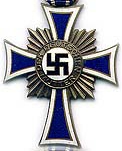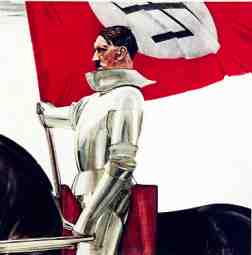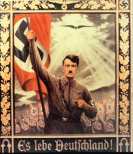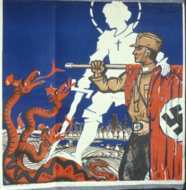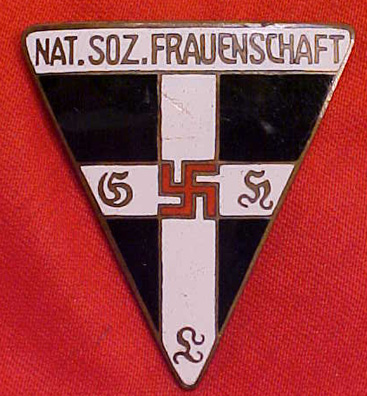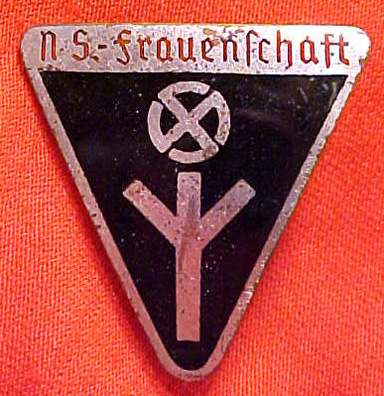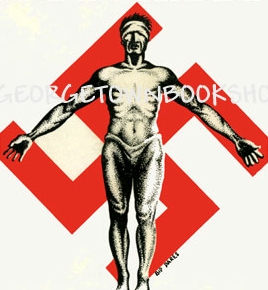A lot of fascinating research examines the history of demonic
possession and exorcism. Much of the work examines the practices of exorcists.
Most commentary is superficial, with very little critical analysis of the
danger to human life.
http://rexcurry.net/exorcism-possession-exorcist-demons.html
According to the Vatican's chief exorcist, the devil possessed the leader
of the National Socialist German Workers' Party and the leader of the Union
of Soviet Socialist Republics. Father Gabriele Amorth, Pope Benedict XVI's
'caster out of demons,' made those comments during an interview with Vatican
Radio. He might also be called a demonologist.
Father Amorth's comments indicate that the worst case of demonic possession
in the history of the earth was the socialist Wholecaust (of which the Holocaust
was a part): 65 million slaughtered under the Union of Soviet Socialist Republics
(USSR); 49 million under the Peoples' Republic of China (PRC); 21 million
under the National Socialist German Workers' Party (NSGWP). It was the
worst loss of life ever. Satan is a socialist. Were the people in this image
possessed?
http://rexcurry.net/socialists.jpg
Some research focuses specifically upon haunted or possessed places (see
e.g. "The Worlds Most Haunted Places"). If such places exist, then they
are most numerous in Russia, Germany and China.
Their satanic leaders combined religion with socialism, and they worshipped
government. In 1939 the National Socialist German Workers' Party and the
Union of Soviet Socialist Republics joined as allies to invade Poland in
a pact to divide up Europe. Armageddon, the apocalypse, and the Great Wars
against humanity were visible in their work. After WWII, Stalin and Mao went
on to kill even more people. Socialism is hades.
http://rexcurry.net/wholecaust-museum.html
Father Amorth said: "Of course the Devil exists and he can not only possess
a single person but also groups and entire populations." He added that he
is convinced that members of the National Socialist German Workers' Party
were all possessed. "All you have to do is think about what they did [the
leaders of German National Socialism and of Soviet Socialism]. Almost certainly
they were possessed by the Devil."
According to secret Vatican documents recently released, wartime pontiff
Pope Pius XII attempted an unsuccessful "long distance" exorcism of the leader
of the German National Socialists.
Said Father Amorth, "I have no doubt that [the German Socialist leader]
was possessed and so it does not surprise me that Pope Pius XII tried a long
distance exorcism."
Father Amorth is president of the International Association of Exorcists.
Father Amorth is said to have carried out more than 30,000 exorcisms in his
career and his favourite film is, according to Italian newspapers, The Exorcist.
A cross or crucifix is relied upon by exorcists in exorcisms.
Most people do not know that a deformed cross was worshiped as the notorious
symbol of the National Socialist German Workers' Party. The group called
their symbol the Hakenkreuz, not the swastika. Hakenkreuz means "hooked cross."
It is one of the biggest cover-ups in history.
In the USA the hooked cross was a common symbol and was referred to as a
cross (armed cross, twisted cross, crooked cross, hooked cross) before "swastika"
became dominant. The eventual dominance of "swastika" occurred in part to
distance the hooked cross from the Christian Cross.
Although the swastika was an ancient symbol, the noted cryptographer and
symbologist Dr. Rex Curry (author of "Swastika Secrets") discovered that
it was also used sometimes by German National Socialists to represent "S"
letters for their "socialism." With a 45 degree turn of his Hakenkreuz,
the leader of German National Socialists used the "swastika flag" to combine
the cross with collectivism, merge church and state, mesh religion and socialism,
and mandate the worship of government. He altered his own signature to use
the same symbolism and similar alphabetic symbolism still shows on Volkswagens.
http://rexcurry.net/book1a1contents-swastika.html
Support for Dr. Curry's work comes from other authors who believe the Holocaust
under the National Socialist German Workers Party was a demonic Inquisition
(including religious persecution) undertaken by the leader of German National
Socialism.
Some research in this field focuses on "Possessed Possessions," as in the
book entitled "More Haunted Antiques, Furniture and Collectibles," by Ed Okonowicz.
If such things exist, then they are most numerous in Russia, Germany and
China and must include hooked crosses, little red books, Stalin's tomb, and
even haunted cars: Trabants and Volkswagens. They probably include
haunted dolls who witnessed the children who cherished them railroaded to
concentration camps by German Socialists or Soviet Socialists. Well-used mirrors
(maybe too well-used?) in the homes of people who had their private property
confiscated (stolen) for the glorious peoples' movement. Chairs that can't
be content sitting in rooms alone where their masters were enslaved or liquidated.
In the 1930's, religious people were persecuted for refusing to give the
straight-arm salute to the national flag. That persecution occurred in the
USA (to the stars and stripes) and in Germany (to the swastika flag) at the
same time. Today, most people in the USA were educated in socialist schools
(government schools) so they are ignorant of the fact that it was happening
in both Germany and the USA.
http://rexcurry.net/jehovahs-witnesses-fight-socialism-in-USA.html
Religious children and children of various races and backgrounds were required
by law to perform the straight-arm salute in government schools in robotic
chanting every morning at the ring of a government bell (just as it is done
today but with a different gesture). Many people considered the raised-arm
salute to the national flag to be sacrilegious worship of government and socialism.
Religious people had good reasons to consider the pledge / salute to be sacrilegious,
in that Germans used the ritual toward their Hakenkreuz symbol, the "hooked
cross."
Dr. Rex Curry showed that the straight-arm salute to the national flag originated
in the USA's Pledge of Allegiance, as written by a socialist. The
USA used the straight arm salute to the national flag for three decades before
German National Socialists started doing the same thing.
The salute was created by Francis Bellamy, a minister who was cast out
because he used the pulpit to push his socialist dogma in sermons on themes
like "Jesus the Socialist."
http://rexcurry.net/book1a1contents-pledge.html
Francis was cousin and cohort to Edward Bellamy, author of "Looking Backward"
an international bestseller that was known as the "Bible of National Socialism."
Edward also authored "The Religion of Solidarity" and other articles and
books with similar ideas.
Both Bellamys worked together to promote socialism and they wanted the
government to take over all schools to spread their dogma. Both Bellamys
descended from a long line of ancestors who touted similar dogma for generations.
http://rexcurry.net/bookchapter1a1i.html
**************************
Of the leaders of the socialist Wholecaust, Father Amorth said, "You can
tell by their behaviour and their actions, from the horrors they committed
and the atrocities that were committed on their orders. That's why we need
to defend society from demons."
Father Amorth said: "It's very rare that praying and attempting to carry
out an exorcism from distance works.
"Of course you can pray for someone from a distance but in this case it
would not have any effect.
"One of the key requirements for an exorcism is to be present in front
of the possessed person and that person also has to be consenting and willing.
"Therefore trying to carry out an exorcism on someone who is not present,
or consenting and willing would prove very difficult.
The Protestant Reich Church was formed by under the National Socialist German
Worker's Party in 1933, by merging 29 regional churches into one church.
The founding of the church was the result of work by the German Christian
Socialists.
During the war, Alfred Rosenberg drew up a thirty-point program for a new
"National Reich Church." One point declared that the "Hakenkreuz" (hooked
cross or swastika) would be the type of cross used in the Church.
The American socialists were like all socialists in that they hated the U.S.
Constitution and wanted to destroy it because, back in the old days, people
actually thought that the U.S. Constitution was supposed to limit the size
and scope of government.
"Looking Backward" was so popular that it was translated into every major
language, including German, Russian, and Chinese. It immediately inspired
a supportive political movement with “Nationalism Clubs” worldwide.
In 1939 the National Socialist German Workers' Party and the Union of Soviet
Socialist Republics joined as allies to invade Poland in a pact to divide
up Europe.
Armageddon, the apocalypse, and the Great Wars against humanity were visible
in the socialist Wholecaust (of which the Holocaust was a part): 65 million
slaughtered under the Union of Soviet Socialist Republics (USSR); 49 million
under the Peoples' Republic of China (PRC); 21 million under the National
Socialist German Workers' Party (NSGWP). Their satanic leaders would not
separate church and state, they combined religion with socialism, and they
worshipped government. After WWII, Stalin and Mao went on to kill even more
people. Socialism is hades.
http://rexcurry.net/wholecaust-museum.html
It all shows how close the USA came (and is still coming) to the socialist
Wholecaust. Many Americans are sad examples of how places like that come
into existence, grow so large, last so long, and kill so many.
Historians make their work relevant to current events. Such stories are
relevant to the fact that the present government in the USA is anti libertarian
and is out-socializing the previous administration by more than double and
growing (in social spending ALONE). The demonic dogma of socialism, sacrifice,
and self-sacrifice is still growing all over the world.
The government should not run Sunday school, nor Monday school through
Friday school. The First Amendment should be enlarged to state that congress
shall make no law respecting an establishment of education nor an establishment
of religion, or prohibiting the free exercise thereof. The separation
of school and state is as important as the separation of church and state.
**************************
The leader of the National Socialist German Workers Party (NSGWP) was believed
to be of Christian faith by many people. He was influenced by the Christian
Social movement and its founder Karl Lueger, after Luerger's rise to power
in Vienna in 1897. Vienna mayor Karl Lueger was credited in 'Mein Kampf'
as a role model and inspirational figure to the leader of the NSGWP. The
book
Culture and Political Crisis in Vienna : Christian Socialism in Power,
1897-1918 is by John W. Boyer and he traces the movement's evolution
from a dissident political group of disparate ward politicians, through its
maturation into the largest single party in the Austrian parliament by 1907,
to its major role in Imperial politics during the First World War.
In his book The Holy Reich (Nazi Conceptions of Christianity, 1919-1945)
Richard Steigmann-Gall argues persuasively that the the National Socialist
German Workers' Party did not reject Christianity,
In the historic film "Triumph of the Will," the leader of the National
Socialist German Workers' Party states: "The Party will be like a religious
order."
**************************
It is frightening how far the USA joined in the depravity. The major Supreme
Court cases about the pledge involved religious children in government schools
who were being forced to robotically chant the pledge to the national flag
with the straight-arm salute. Those cases began in the 1930's but did not
reach decision until 1940 & 1943. At first the children were unsuccessful
in the USA. Socialists persecuted the children, expelled them from
the socialist schools, arrested their parents, seized children from parents
on allegations of "unfit parenting," and many children had to flee and use
the many better alternatives, including home-schooling and their own church
schools (but they and their schools were often persecuted by socialists there
also).
At the height of National Socialism abroad, the USA's government deliberately
fell farther into the same abyss with national numbering of humans imposed
in 1935 with the social security system. The federal government was growing
massively and attempting to nationalize the economy in many ways. The US
Supreme Court struck down much of the new legislation as unconstitutional
until justices were pressured by the "switch in time that socialized nine."
It is sad to note that during the same time period in the USA, religious
people who were fleeing the National Socialist German Workers’ Party (NSGWP)
were turned away from the USA, and knowingly sent to suffering and death.
That happened because of socialists who support restrictions on immigration
and on every American’s right to hire, to do business, and to freely associate.
It was similar to today. Socialists in the USA still support restrictions
on immigration and they reject the right of every American in living with,
marrying, renting to, selling to, buying from, hiring (as housekeeper, lawn
man, doctor, nanny, teacher etc) any person with whom that American wishes
to associate. Little has changed.
The USA still follows similar anti libertarian policies promoted by the
Bellamys. Many socialist Bellamy policies caused the USA’s big, expensive
and oppressive government and its growing police-state. The Bellamys promoted
the U.S. disaster of old prohibition, as well as modern prohibition. It
caused the Great Socialist Depression (from the Federal Reserve Act of 1913,
the Smoot-Hawley Tariff Act 1930 etc) that persisted and even lasted through
U.S. involvement in WWII. Socialism's quest for omniscience was enlarged with
social security numbers in 1935 to track and tax everyone, as the USA followed
the path of German National Socialists at the height of their power. The
federal government grew massively and nationalized the economy in many ways.
The Pledge still exists along with laws mandating that teachers lead
the robotic pledge chanting every day for twelve years of each child’s life
(though the salute was altered). The government still owns and operates schools.
The U.S. practice of imposing segregation by law in government schools and
teaching racism as official policy outlasted the National Socialist German
Workers' Party by over 15 years. After segregation in government's schools
ended, the Bellamy legacy caused more police-state racism of forced busing
that destroyed communities and neighborhoods and deepened hostilities. Those
schools still exist. Infants are given social security numbers (socialist
slave numbers) that track and tax them for life. Government schools
demand the numbers for enrollment.
******************************
The Bellamys were bigots and racists and they obsessed about immigrants
coming into the USA. They wanted to impose a heavy-handed method of
brain-washing immigrants and all Americans into accepting their socialist
dogma. Because of the Bellamys, the USA has a long history of turning
immigrants away from being good Americans and independent capitalists, and
in turning immigrants into socialists who are dependent on government.
The Bellamys promoted a government takeover of schools, and when the government
granted their wish, the government schools imposed segregation by law and
taught racism as official government policy.
It is also true that German National Socialists did not refer to themselves
with the hackneyed shorthand n-word, nor the f-word, and there is no such
use in
Mein Kampf nor in
Triumph of the Will. Modern
writers, on the other hand, cover-up the truth and never use the actual name
of the horrid Party, and deceitfully use the shorthand terms, exclusively
to perpetuate widespread ignorance, and that is why those terms are trite.
The Hakenkreuz (hooked cross) was an ancient religious symbol in Germany,
related to the un-hooked cross and to the Prussian-German Iron cross and
to other crosses.


